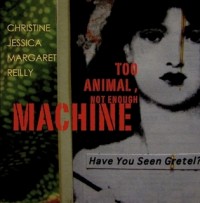 Too Animal, Not Enough Machine: Have You Seen Gretel?
Too Animal, Not Enough Machine: Have You Seen Gretel?
Christine Jessica Margaret Reilly
Sundress Publications, July 2013
46 pages / $10.00 buy from Sundress Publications
Rating: 8.0
Christine Jessica Margaret Reilly’s collection Too Much Animal, Not Enough Machine: Have You Seen Gretel re-imagines the Grimm’s Tale of Hansel and Gretel alongside other mythological characters in new, haunting, and evocative ways. I’m always intrigued by the recasting of myths in contemporary landscapes, as many of our myths are fraught with monsters and madness that intend to expose the horrifyingly hideous rather than teach valuable life lessons. Reilly places Hansel and Gretel in today’s New York City, and her retelling with this backdrop prove itself skillful, chilling, and revitalizing.
While these poems exhibit undeniable darkness, they also weave in humor and highlight problematic societal constructs for children coming of age. In “Gretel Notices the Whale is a Witch or Gretel Notices the Whale Has a Kitchen that Has Not Been Remodeled Since the 70’s,” Reilly outlines a stark critique of gender constructs and the notion of fairy tales serving as moral cautionary tales.
“Gretel smells wolf in the Whale’s hair as she counts the days till she’s free
on her fingers. On the fridge there are magnets of the children who
died of too much fun the Whale explains. But Gretel’s no fool.
Things go down like a pianissimo in her, her body feels too
animal and not enough machine, her throat flaking off
and the room is a fluted boat, a vague sheet
being quilted, seams waning inward like
ribs, but Eat up you’re a growing
girl the whale says with
spiced breath. It’s a
free f(or)all.”
In this passage, the form visibly withers on the page, just as Gretel’s inward self shrinks from the idea of being warned not to have “too much fun.” Ironic, considering the witch’s (or whale’s) purpose is to fatten her up to consume her. In Gretel feeling “too animal,” she reveals the way she’s being punitively forced to abandon her own nature for a more favorable, well mannered version of what a young girl should be and want. This loss becomes her “free fall” from happiness.
The poems further intrigue through their exploration of abused children. In “Gretel in the Children’s Ward”:
“Don’t talk. You’re broken in 37 places, the doctor says.
Red says in some versions she cuts herself out and
just don’t tell, in others it’s the woodsman.”
Here, several child characters discuss their sad fates. The poem exposes the scary fact that many fairy tales severely abuse the children in them, and traumatized children remain silenced. In this excerpt, Red Riding Hood imagines herself taking agency for her own escape or being rescued, but she never imagines herself not being hurt. And the doctor caring for her reminds her that she’s too broken to speak at all.
In “Jonah, You Have to Believe Me,” Reilly gives voice to the abuser. The entire poem is told through the whale’s apologetic standpoint.
“Please know you’re safe,
cognize white noise of sobbing
like strumming guitar with mittens,
like the brute sucking sound
of a glass jar. Jonah, what’s that
other noise? Which one of us
is whispering save me?”
The poignant part of this resides in the fact that the victim and abuser parallel each other in pain, thus blurring the simple lines of good versus evil in fairy tales and illuminating the tragically painful motives and missteps in logic from abusers.
Reilly’s collection puts iPhones in Hansel’s hands and lets Gretel wander through the trash littered alleyways of New York City, breathing chilling life into the original dark tales.
Tags: Christine Jessica Margaret Reilly, Sundress Publications, Too Animal Not Enough Machine: Have You Seen Gretel?
